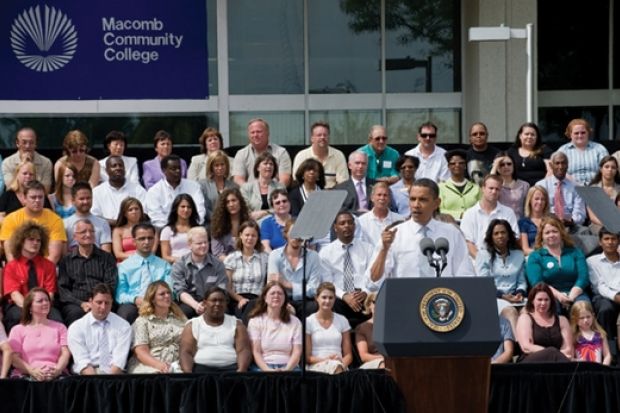Samantha Raad, a student at Macomb Community College near Detroit, laughs when asked how much longer it will take her to receive her two-year associate's degree in social work.
She has already attended the public college for three years.
"I've just been basically (attending the sessions) I've been able to pay for," said Ms Raad, who hopes to go on to bachelor's and master's degrees. "That makes it take a lot longer than I planned."
The 22-year-old said she had thought about dropping out and committing full-time to her job as a carer for disabled adults. But she said that if she did, "I don't think I'd end up going back, and I would really regret that. I would have lost the motivation."
Many US students, however, are giving up. Only one in five who enrols on a two-year public community college course graduates within three years, while just half of the students who attend four-year university courses get their degrees within six years.
These figures have resulted in the US sliding from first to 10th among members of the Organisation for Economic Cooperation and Development for the proportion of the population with postsecondary degrees.
It is a trend that President Barack Obama, in a speech at Macomb two years ago this month, promised to reverse.
The president's American Graduation Initiative set a goal to restore the country to first place by 2020 in the proportion of 25- to 34-year-olds with college degrees. He made community colleges, which enrol 43 per cent of American students, the linchpin of the strategy, calling on them to increase their graduation rates by 50 per cent.
Yet in the two years since, the barriers to graduation have not been lowered, but raised.
And while no hard data are yet available, experts say it is unlikely that graduation rates will improve, and they may even fall. Almost none believe the 2020 target will be met.
Overworked, not unprepared
"The outlook is not good," said Michael Lovenheim, assistant professor of policy analysis and management at Cornell University, whose research has found that students are now taking more time to graduate, not less.
His findings contradict US universities' common contention that graduation rates are falling because students are arriving unprepared.
US school leavers are, in fact, better prepared than ever, he found, but most attend unselective community colleges and public universities where budgets have been cut deeply, or have to work to meet rising tuition costs, eating into their study time. And the longer it takes students to finish their degrees, Professor Lovenheim found, the more likely it is that they will give up.
That is only one of the barriers to graduation that have grown in the two years since Mr Obama announced the target.
States have slashed billions of dollars more from public higher education, forcing an 8 per cent rise in fees at public four-year institutions nationwide at a time when the inflation rate is barely 1 per cent.
The financial aid that many students need to meet these rising costs is also facing cuts, as is the principal federal financial-aid programme, Pell Grants, which congressional budget-cutters want to slash by 45 per cent.
Nearly two-thirds of community college students already work at least 20 hours a week to pay their way, despite the evidence that working increases the odds of them dropping out.
"It's ironic that as soon as students take us up on the offer of aspiring to higher education, we tell them: 'Sorry, we've run out of money,'?" said José Cruz, vice-president of higher education practice and policy at lobby group the Education Trust.
Republicans, meanwhile, have derided Mr Obama for his emphasis on higher graduation rates at a time of rising unemployment.
"A college degree doesn't do any good if there aren't any jobs," said Virginia Foxx, the Republican representative for North Carolina's 5th congressional district and chair of the House higher education subcommittee, who has questioned the rationale for the president's graduation goals.
The White House did not respond to requests for comment.
In spite of rising fees, enrolment continues to increase as US students opt to sit out the economic downturn by improving their qualifications.
The number of full-time students at community colleges has risen by more than 24 per cent since 2007, contributing to another problem: intense competition for places on the courses students need to complete their degrees.
"The waiting lists for classes are insane sometimes," Ms Raad said. "I feel like it should be a lot easier than this."
Register to continue
Why register?
- Registration is free and only takes a moment
- Once registered, you can read 3 articles a month
- Sign up for our newsletter
Subscribe
Or subscribe for unlimited access to:
- Unlimited access to news, views, insights & reviews
- Digital editions
- Digital access to THE’s university and college rankings analysis
Already registered or a current subscriber? Login
